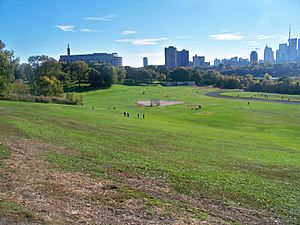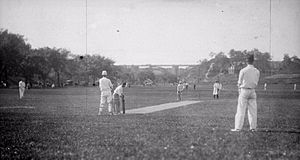Riverdale Park (Toronto) facts for kids
Quick facts for kids Riverdale Park |
|
|---|---|

Riverdale Park, looking south
|
|
| Lua error in Module:Location_map at line 420: attempt to index field 'wikibase' (a nil value). | |
| Type | Public Park |
| Location | Toronto, Ontario |
| Area | 104 acres (42 ha) |
| Created | 1880 |
| Operated by | City of Toronto |
Riverdale Park is a very large park in Toronto, Ontario, Canada. It stretches across the Don River valley. The park is located between the Cabbagetown area to the west and the Riverdale area to the east. It is a popular spot for many outdoor activities and offers great views of the city skyline.
Contents
What Can You Do at Riverdale Park?
Riverdale Park has many fun things to do on both sides of the river.
Sports and Recreation
You can find large fields for different sports like soccer, baseball, and Ultimate Frisbee. There is also a swimming pool, tennis courts, and an outdoor hockey rink in the northeast part of the park. A running track is located in the center of the park for those who enjoy jogging.
The Footbridge
A special footbridge connects the two sides of the valley. It crosses over the Don Valley Parkway, Bayview Avenue, and the Canadian National Railway tracks. This bridge also links to the Lower Don Recreational Trail, which follows the river. Long ago, around the 1790s, a bridge made of butternut trees was built near this spot by Ely Playter. An old painting from 1796 by Elizabeth Simcoe shows this early bridge.
Nearby Attractions
At the southeast corner of the park, you will find Bridgepoint Hospital. There is also a monument dedicated to Sun Yat-sen, a famous Chinese leader. Just west of the park, in Cabbagetown, is Riverdale Farm. This is a city-run farm that is open to the public, where you can see farm animals.
Summer Movies
During the summer, Riverdale Park hosts a free movie series. Everyone is welcome to bring a picnic, friends, and family. You can enjoy great PG-rated films under the stars. All the movies begin when it gets dark.
History of Riverdale Park
Riverdale Park has a long and interesting history, going back to the early days of Toronto.
Early Land Ownership
The land on the east side of the Don River was first owned by John Scadding. He was an early settler in Toronto and worked for John Graves Simcoe, who was the Governor of Upper Canada. John Scadding's cabin, built in 1794, was once located near the park. It was later moved to the grounds of the Canadian National Exhibition in 1879.
Park Creation
The City of Toronto bought 120 acres (49 hectares) of Scadding's farm in 1856. This land was used for the Don Jail. The rest of the land officially opened as a park in 1880. More land was added later, making the park 162 acres (66 hectares) in size. However, when the Don Valley Parkway was built in the 1960s, the park became its current size of 104 acres (42 hectares). Near the park, on Broadview Avenue, you can still see John Cox Cottage, a log home built in 1807.
First Nations History
In 1886, during road construction east of the park, workers found artifacts from a First Nations settlement. These items showed that Indigenous people lived or camped in the area above the valley long ago. Some of these artifacts are now on display at Withrow Avenue Junior Public School. A special plaque is also at the school's main entrance.
Park Changes Over Time
The eastern side of the park was also used as a landfill in the 1920s. If you walk along Broadview Avenue, you might see green pipes sticking out of the ground. These pipes help to release methane gas from the old dump underneath the park.
In the 1970s, Riverdale Park was considered as a possible location for a new large stadium. This stadium eventually became the SkyDome. However, the plan for the stadium in Riverdale Park was stopped. This was partly due to strong objections from local leader John Sewell.
Environmental Restoration
In 1990, a grassy slope on the eastern side of the park was planted with trees. This was the first public event organized by the Task Force to Bring Back the Don. This group works to restore the Don River and its valley. Today, this slope is a small forest with trees that are about 3–4 meters tall. In 2002, the "Bring Back the Don" group also created a small marsh at the bottom of the slope. This marsh collects water from the slope and nearby playing fields. Other projects have included planting trees along a raised area next to the Don Valley Parkway.
 | DeHart Hubbard |
 | Wilma Rudolph |
 | Jesse Owens |
 | Jackie Joyner-Kersee |
 | Major Taylor |



